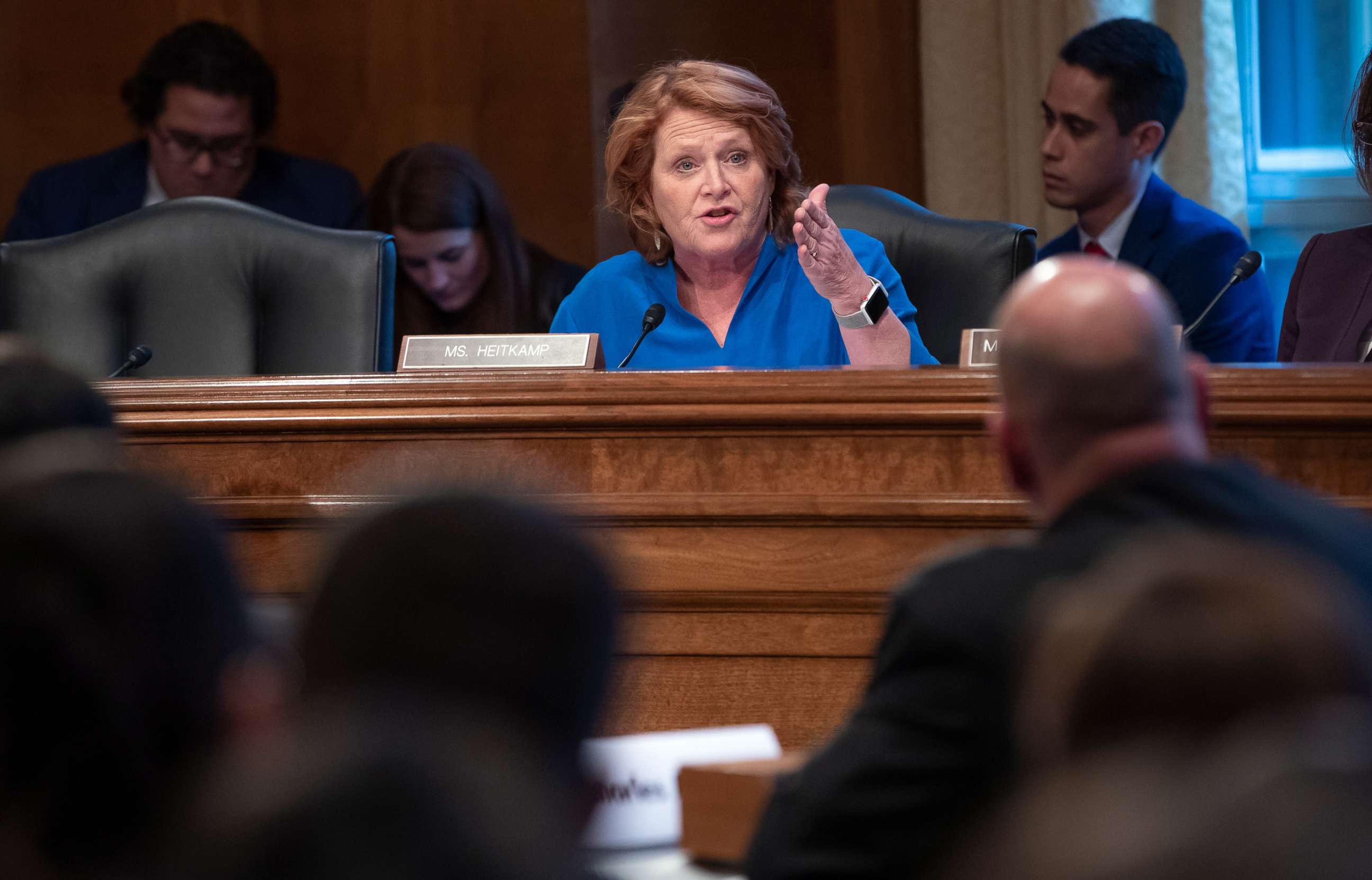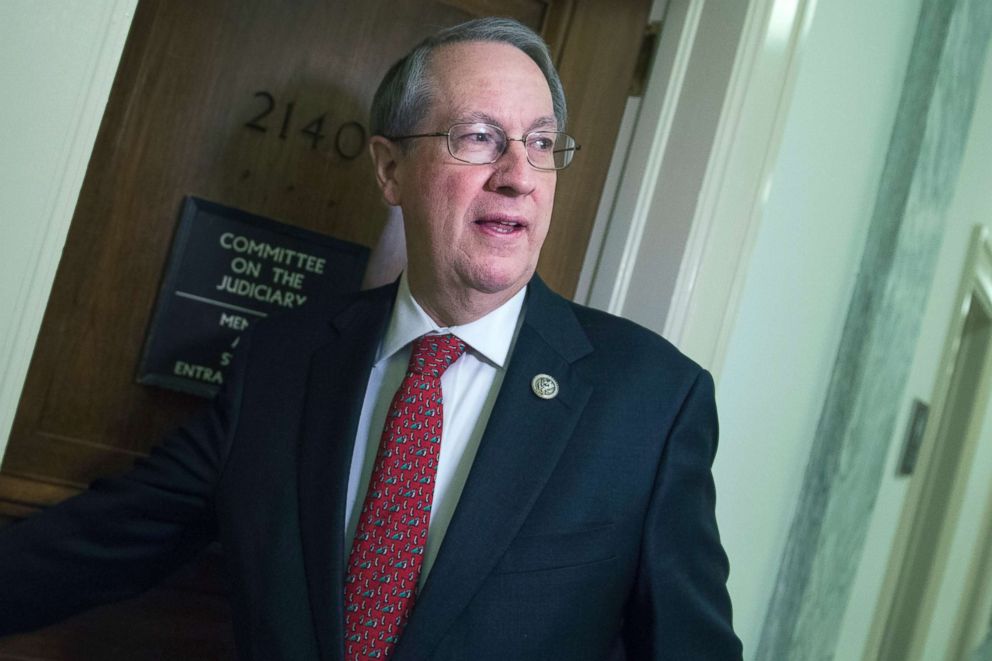Violence against tribal women becomes a backdrop for a battle of legacies between outgoing lawmakers
Rep. Bob Goodlatte is standing between the bill's passage and failure.
In the waning days of their congressional careers, two lawmakers are waging a war to solidify their legacies, and a bill to protect Native American women from violence has become the unlikely battlefield.
Sen. Heidi Heitkamp, D-N.D., who lost her Senate re-election bid, and retiring House Judiciary Committee chairman Bob Goodlatte, R-Va., are on opposite sides of Heitkamp’s bill to strengthen coordination between federal, local and tribal law enforcement authorities in order to better address the dramatic rates of murdered and missing Native American women nationwide.
The bill, Savanna’s Act, would be a legacy-defining accomplishment for Heitkamp, who shepherded through several major bills protecting indigenous people. The retiring Goodlatte, however, has taken several big votes against strengthening tribal protections.
And while his office has responded to Heitkamp’s language with a counteroffer, her team is accusing him of simply trying to run out the clock, because if he is able to block the House from voting before the end of the year, the process has to start all over again next congressional session -- when both Heitkamp and Goodlatte will be gone.
Savanna's Act, which unanimously passed the Senate on Dec. 6, is named for Savanna LaFontaine-Greywind, a member of the Spirit Lake tribe, who was abducted and killed in 2017 in Fargo, North Dakota. In her farewell address to her colleagues, Heitkamp noted the bill as one of the highlights of her congressional career.
"We’re on our way to passing Savanna’s Act, which is going to recognize for the first time the challenge and the tragedy of missing and murdered indigenous women," she said.

According to a 2016 report from the Department of Justice's National Institute of Justice, more than one in five American Indian and Alaska Native women have experienced violence in their lifetime, and in some parts of the country native women face murder rates more than 10 times the national average. The report also noted that the vast majority of Native victims experience violence at the hands of a non-native perpetrator.
Savanna’s Act would require that law enforcement agencies at all levels of government get training in recording the tribal affiliation of victims and conduct outreach to tribes to help them better understand their options in documenting people who have gone missing. It would also require new guidelines on improving law enforcement response rates to cases of missing and murdered indigenous people.
Before the bill hit the House, it was on a smooth, bipartisan path. That consensus was evident last week when the Senate Indian Affairs Committee held a hearing, during which Sen. John Barrasso, R-Wyo., decried the lack of coordination between tribes and law enforcement, which leads to an inaccurate picture of crime affecting Native communities.
“Understanding the scope of the problem is just the first step,” Barrasso said.
But when the bill made it to the House, Goodlatte, in his capacity on the Judiciary Committee, raised concerns that some language in the bill might put some state and local law enforcement at a disadvantage when applying for DOJ grants, according to a House aide.
Then, things slid to a halt, which led to Heitkamp calling out Goodlatte on Twitter.
Goodlatte ultimately sent over the changes he wanted to see to Heitkamp’s office last night -- two weeks after the bill passed the Senate and almost one week after Heitkamp tweeted at Goodlatte.
According to a document reviewed by ABC News, Goodlatte’s edits are extensive, striking entire provisions throughout the bill’s fourteen pages. He wants to remove stipulations that the attorney general "shall give affirmative preference" to applicants for two existing DOJ grant programs from law enforcement agencies that have implemented the guidelines -- the part he feared might discriminate against certain agencies. The Heitkamp aide said that language was a suggestion and was non-binding.
But in a separate edit that Heitkamp hadn’t been expecting, Goodlatte also struck provisions to keep law enforcement agencies accountable for implementing the bill’s new requirements, including requiring the attorney general to keep a public list of law enforcement agencies that have not yet implemented the guidelines.
While Goodlatte hasn’t been particularly outspoken on Native issues throughout his career, this isn’t the first time he has objected to protections specifically for that minority. During an appropriations debate in 2016, he objected to an agreement forged by House and Senate committees that would have set aside some money collected for a Native crime victims fund to be directly allocated among tribes, rather than through state agencies. Goodlatte objected to this set-aside, saying it was an example of "legislating through an appropriations bill."
In 2012, Goodlatte was one of 17 Republicans on the House Judiciary Committee who voted for a version of the Violence Against Women Act (VAWA) reauthorization that lacked protections for Native American women, which had passed as part of the Senate’s version. Those safeguards would have allowed tribes to prosecute domestic violence committed by non-Native perpetrators on tribal lands.

Congress held another vote on VAWA the following year, this time including the expanded legal protections for tribal women. Goodlatte voted against that version.
Spokespeople for Goodlatte, House Speaker Paul Ryan and the Department of Justice did not respond to requests for on-the-record comment.
Given the fact that Savanna's Act passed unanimously in the Senate, Heitkamp's aide argues it would face a similar lack of opposition in the House. But if Goodlatte succeeds in blocking this bill's progress until the end of the month, which is the conclusion of the current congressional session, the process would have to start all over again, beginning back in the Senate.
But some of Heitkamp’s Senate co-sponsors have already vowed to honor her legacy – and that of the bill’s namesake – and get the bill passed next year, even if it means starting from scratch. Sen. Lisa Murkowski, R-Alaska, told ABC News that she has committed to Heitkamp to get Savanna’s Act passed "aggressively and early."
"We’re going to be working it, we’re going to be working it early and we’re going to make the difference," Murkowski said.




